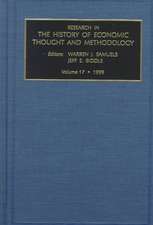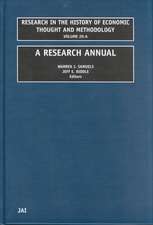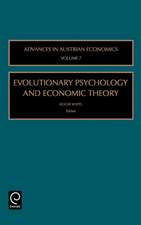The Dynamics of Intervention – Regulation and Redistribution in the Mixed Economy: Advances in Austrian Economics
Autor P. Kurrild–klitgaaen Limba Engleză Hardback – 31 mai 2004
Din seria Advances in Austrian Economics
- 9%
 Preț: 786.85 lei
Preț: 786.85 lei - 23%
 Preț: 723.32 lei
Preț: 723.32 lei - 23%
 Preț: 701.73 lei
Preț: 701.73 lei - 23%
 Preț: 1188.97 lei
Preț: 1188.97 lei - 23%
 Preț: 929.76 lei
Preț: 929.76 lei - 23%
 Preț: 858.97 lei
Preț: 858.97 lei - 23%
 Preț: 887.08 lei
Preț: 887.08 lei - 23%
 Preț: 916.29 lei
Preț: 916.29 lei - 23%
 Preț: 1038.01 lei
Preț: 1038.01 lei - 23%
 Preț: 993.33 lei
Preț: 993.33 lei - 23%
 Preț: 994.83 lei
Preț: 994.83 lei - 23%
 Preț: 945.34 lei
Preț: 945.34 lei - 23%
 Preț: 782.89 lei
Preț: 782.89 lei - 23%
 Preț: 746.00 lei
Preț: 746.00 lei - 19%
 Preț: 684.88 lei
Preț: 684.88 lei - 23%
 Preț: 1149.21 lei
Preț: 1149.21 lei - 19%
 Preț: 651.06 lei
Preț: 651.06 lei - 19%
 Preț: 676.56 lei
Preț: 676.56 lei
Preț: 920.06 lei
Preț vechi: 1194.89 lei
-23% Nou
Puncte Express: 1380
Preț estimativ în valută:
176.06€ • 184.28$ • 146.53£
176.06€ • 184.28$ • 146.53£
Carte tipărită la comandă
Livrare economică 31 martie-14 aprilie
Preluare comenzi: 021 569.72.76
Specificații
ISBN-13: 9780762310531
ISBN-10: 0762310537
Pagini: 468
Dimensiuni: 155 x 234 x 635 mm
Greutate: 0.78 kg
Editura: Emerald Publishing
Seria Advances in Austrian Economics
ISBN-10: 0762310537
Pagini: 468
Dimensiuni: 155 x 234 x 635 mm
Greutate: 0.78 kg
Editura: Emerald Publishing
Seria Advances in Austrian Economics
Public țintă
Academics, Professionals and StudentsCuprins
1.The dynamics of intervention. The political economy of the dynamic nature of government intervention: An introduction to potentials and problems (P. Kurrild-Klitgaard). The dynamics of interventionism (S. Ikeda). From Laissez-Faire to Zwangswirtschaft: The dynamics of interventionism (J. Hagel Iii, W. E. Grinder). Austrian economics, praxeology and intervention (W. Block, W. Barnett II). 5. Regulation, more regulation, partial deregulation, and reregulation: The disequilibrating nature of a rent-seeking society (B. L. Benson).6. The Austrian theory of the business cycle: Reflections on some socio-economic effects (W. E. Grinde, J. Hagel III). The political economy of crisis management: Surprise, urgency, and mistakes in political decision making (R. D. Congleton). The conflict about the middle of the road: The Austrians versus public choice (E. Moberg). If government is so villainous, how come government officials don’t seem like villains? with a new postscript (D. B. Klein). 10. Ulysses and the rent-seekers: The benefits and Challenges of constitutional constraints on Leviathan (P.Kurrild-Klitgaard). The ongoing growth of Government in the economically advanced countries (R. Higgs). Interventionist dynamics in the U.S. energy industry (R. L. Bradley, Jr.). The dynamics of interventionism: A case study of British land Use regulation (M. Pennington). Harm reduction and sin taxes: Why Gary Becker is wrong (M. Thornton). 15. Government regulation of behavior – In public insurance systems (R.. Höijer). Interventionism and the structure of the Nazi State, 1933-39 (O. Volckart). Law and politics: Reflexions upon the concept of a spontaneous order and the EU (J.-E. Lane). 2. The Austrian business cycle debate. Professor Tullock on Austrian business cycle theory (W. Block, W. Barnett II). The Austrian view of depressions (G. Tullock).



















